News
Follow the news of the REAB Consortium and the market, stay up to date.

Sergei Shishkarev, chairman of the board of directors at Russia’s Delo Group, has announced the concept of establishing a grain hub in Oman. He stated that “We are looking into establishing a grain transshipment hub, possibly for processing, or to conduct trading operations in the Sultanate of Oman, followed by redistribution and delivery of the grain to African countries.”
Shishkarev said that this primarily concerns the east coast of Africa, where many countries consume Russian grain.
The Delo Group intends to establish a presence in grain elevators and warehouses in grain-consuming areas in Saudi Arabia, the United Arab Emirates, Oman, and possibly Nigeria and Ethiopia as part of its development strategy to 2035.
The Delo Group operates marine container terminals in the Azov-Black Sea, Baltic, and Far Eastern basins; a network of railway container terminals; and a fleet of containers and flatcars. The group’s transportation and logistics division includes the TransContainer intermodal container operator and the Ruscon multimodal transport operator, and the stevedoring division includes DeloPorts and the Global Ports leading container terminal operator.

Last week, REAB Consortium Board Member and Marketing Director Ilya Pashchenko concluded his working visit to Oman. As members of the Russian and Ural Chambers of Commerce and Industry, we traditionally begin our work in each new country with an introduction to the national Chamber of Commerce and Industry. Such a meeting took place in Muscat, Oman's capital.
Our representative held initial talks with Ms. Sharouq Hamed Al-Farsi, Section Head of the Foreign Investment Committee. The meeting presented REAB's activities and the consortium's capabilities to support Omani-Russian business cooperation, and discussed support for Russian entrepreneurs launching or acquiring businesses in Oman with REAB's assistance. Given that Russian businesses have long been established in the UAE and are actively working with Qatar, but are just discovering Oman, the parties identified and discussed the great potential for mutually beneficial cooperation between our countries. REAB received approval and support for these initiatives from the Oman Chamber of Commerce and Industry.
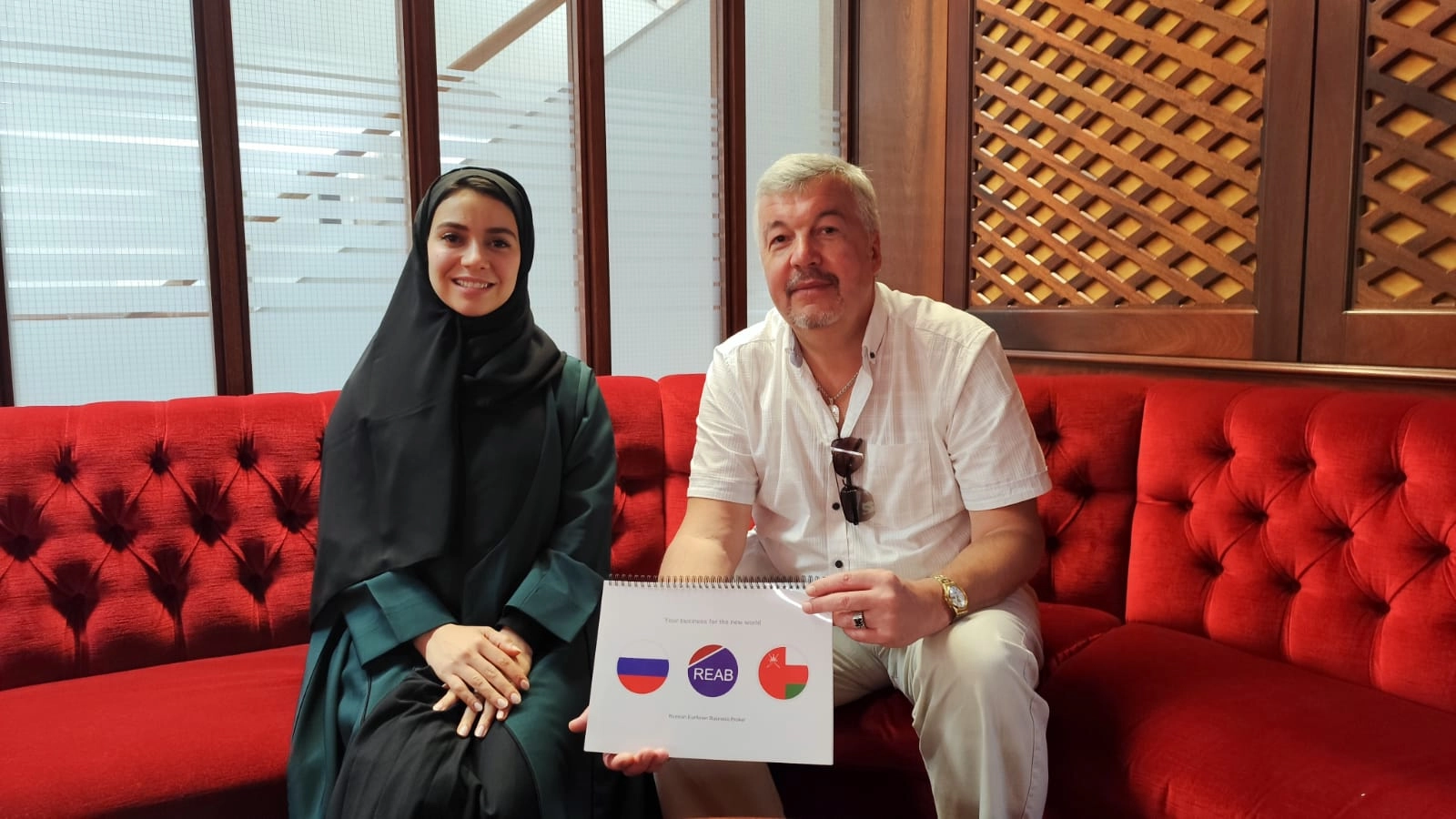
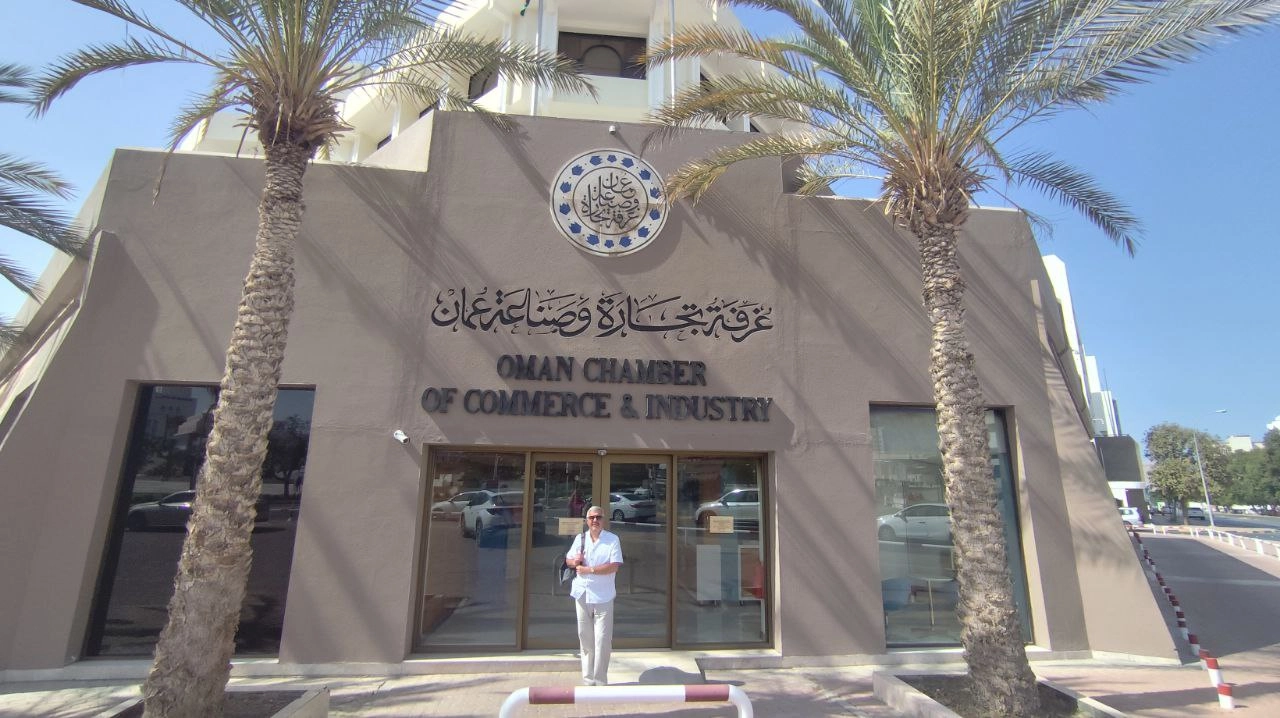
Tags:
Dear colleagues, partners, and friends!
We sincerely wish you a Happy New Year! The past year has been challenging, but we look to the future with optimism. Economic and political turbulence prevents us from resting on our laurels, but on the other hand, it brings not only challenges but also new opportunities. Investment capital is on the rise globally, while good investment assets are becoming increasingly scarce. Under these circumstances, professional brokerage is becoming even more in demand. Therefore, we look forward to a busy year ahead, successfully closed deals, new and useful contacts around the world, continued advancement in the Russian and international markets — and the professional satisfaction that comes from quality work.
We wish you all new achievements, success, happiness, peace, health, and prosperity in 2026!

Tags:
In early December’s meeting of the Russia-Uzbekistan Intergovernmental Commission on Economic Cooperation in Tashkent has illustrated that the two countries are rapidly deepening their economic partnership and achieving new historic milestones in trade, investment, and industrial cooperation. Significant capital investments are being made.
Co-chaired by Uzbekistan’s Deputy Prime Minister Jamshid Khodjaev and Russian First Deputy Prime Minister Denis Manturov, Khodjaev announced that the total portfolio of joint investment projects has surpassed US$55 billion. To put that into context, that is about 3.5 times more than the total mutual investments between the United Kingdom and China.
This milestone reflects unprecedented confidence in the long-term strategic trade and investment alignment between the two economies. It marks not only the highest level of bilateral investment cooperation in the modern history of Uzbek-Russian relations but also enshrines the economic partnership as one of the most dynamic in the entire Eurasian region.
According to Khodjaev, Uzbekistan expects to absorb more than US$5 billion in Russian investment by 2026, with US$4 billion already utilized as of late 2025. Manturov, during his working visit to Tashkent, also met with President Shavkat Mirziyoyev and discussed the accelerated implementation of joint projects in key sectors of the economy. His participation in the Russian-Uzbek Business Forum highlighted Moscow’s commitment to deepening pragmatic, sector-focused cooperation. Manturov’s presence signalled that bilateral investments are moving decisively from declarations toward concrete representations, representing nearly 50% of the entire Central Asian population, while structural reforms are aimed at attracting foreign capital.
In this context, Russia has secured its place as one of the primary partners in Uzbekistan’s modernization agenda. This qualitative expansion of human resources creates significant opportunities for Russian companies to trade with and invest in Uzbekistan, as a more skilled and prosperous population drives demand across consumer markets. Developing human capital will also be essential for advancing agro-industrial, technological, and manufacturing cooperation, ensuring that both countries benefit from a stronger, higher-quality workforce. In this regard, the $55 billion portfolio of investment projects serves as a powerful lifeline for the Uzbek economy, driving modernization, industrial growth, and long-term competitiveness.
Khodjaev emphasized that the investment portfolio provides a “solid foundation for new production capacities, employment growth, and increased tax revenues.” Today, over 3,100 Russian-capitalized enterprises operate in Uzbekistan, including 300 new companies launched in the past year, representing nearly 20% of all foreign-owned enterprises in the country. Russian investment in Uzbekistan has already reached about US$4 billion, underscoring steady confidence in the country’s reform-driven growth trajectory. Tashkent is positioning itself as one of Eurasia’s most attractive destinations for long-term Russian capital. This will yield tangible returns in the form of new production facilities, jobs, and tax revenues. On the Russian side, Denis Manturov stressed that the two countries must “ensure the full implementation of the US$55 billion investment package,” underscoring that industrial cooperation has become the central driver of bilateral growth.

Tags:
Russia will cooperate and share its cybersecurity and services digitalization with Bahrain, as well as in the oil and gas industry, according to Russian Minister Olga Lyubimova, the co-chair of the Russian-Bahraini intergovernmental commission on trade, economic, scientific, and technical cooperation.
She was speaking at the 4th meeting of the Russian-Bahraini intergovernmental commission on trade, economic, scientific, and technical cooperation with Bahraini Industry and Commerce Minister Abdulla Fakhro.
Lyubomova said that “We are focusing on cooperation in the pharmaceutical and automotive industries and raised the issue of building systematic work in the area of technologies and equipment for the fuel and energy sector. For our part, we are ready to create all conditions for sharing experience with Bahraini partners in such areas as cybersecurity and digitalization of the service sector, the oil and gas industry, and the educational environment.”
Russia’s Minister of Culture, also mentioned the mutual tourist flow between Russia and Bahrain increased 8% last year.
The Bahraini Industry and Commerce Minister, Abdulla Fakhro, noted the prospects for further active cooperation between Russia and Bahrain in various areas, including industry, tourism, sports, and culture. He said that “we need to focus our efforts on increasing bilateral trade, especially paying attention to investment opportunities in the fuel and energy sector and in the oil and gas industry.”
Bahrain is a dialogue partner state to the Shanghai Cooperation Organisation, and is also in the process of negotiating a Double Tax Treaty with Russia, in addition to a strategic customs agreement, developments that could later lead to a Bahrain-Eurasian Economic Union Free Trade Agreement.
The two countries often coordinate on issues relating to OPEC and global oil supplies, while also looking at positioning Bahrain as a Middle East grain distribution hub as an extension to the INSTC reach into the Gulf.
Current bilateral trade is small at about US$100 million but has been growing at 15% during 2025, illustrating that Russia-Bahrain trade remains a growth development market.

The Eurasian Economic Union (EAEU) and India have held the first round of negotiations on a free trade agreement at the end of November in New Delhi, according to Russia’s Economic Development Ministry.
The EAEU includes Armenia, Belarus, Kazakhstan, Kyrgyzstan and Russia and has a collective GDP (PPP) of about US$8.5 trillion. The EAEU’s GDP per capita (PPP) is approximately US$44,888, with a population of 185.5 million.
India is notoriously difficult when it comes to negotiating trade agreements, as it is highly protective of its own markets. However, this is unlikely to be a major barrier to an agreement with the EAEU as EAEU member states are unlikely to significantly compete with Indian domestic companies in the Indian market. The timing of the negotiations is of note as it provides India with positive news it can present to the Russian President, Vladimir Putin, who visits Delhi later in early December.
The FTA negotiations include resolving issues related to customs administration, as well as applying sanitary and phytosanitary measures and technical regulations in addition to tariff liberalization. Russia and India also addressed competition, intellectual property protection, e-commerce, and the further development of cooperation in various economic sectors.
Russia’s Deputy Economic Development Minister, Vladimir Ilychev said “Russia is interested in expanding trade and economic cooperation with India. It is the world’s largest country by population and Russia’s third-largest trading partner. The agreement should provide preferential access for Russian economic operators to a market with 1.5 billion people, and the elimination of prohibitive tariffs on the Indian market, which can exceed 100%, and should facilitate the diversification of Russian exports.”
The India-EAEU agreement can be expected to be similar to the recent EAEU FTA agreed with Iran. Details of that, which reduced import tariffs on 87% of all traded goods and can be seen here. Since that agreement came into effect, Russia-Iran bilateral trade increased by 35%. A final agreement between India and the EAEU may however be two-three years away, but at least the process has now formally begun.
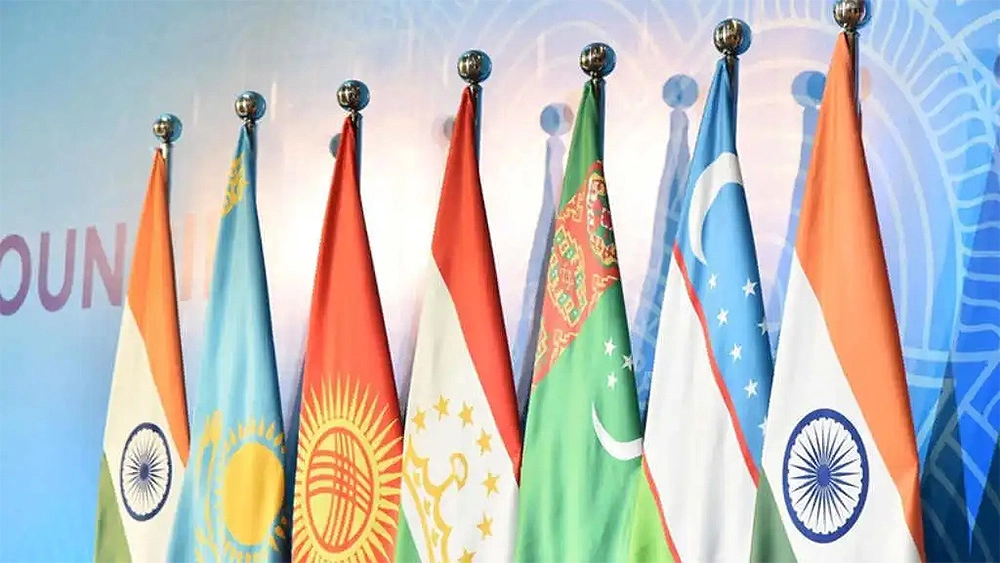
In October 2025, Ilya Pashchenko, a member of the REAB Consortium Board and REAB's representative in the Middle East, visited Qatar. He held a working meeting with a representative of the Qatar Chamber of Commerce and Industry. During the meeting, the parties exchanged their views on the prospects for developing relations between Russian and Qatari businesses and economic cooperation between the two countries in light of Russia's growing business presence in the region. They also discussed practical cooperation between the Consortium and the Chamber in this regard.
A working meeting was also held with a representative of a Qatari investment and consulting company, where they discussed practical issues of supporting Russian businesses in Qatar, including registering and launching new businesses, or acquiring existing ones.
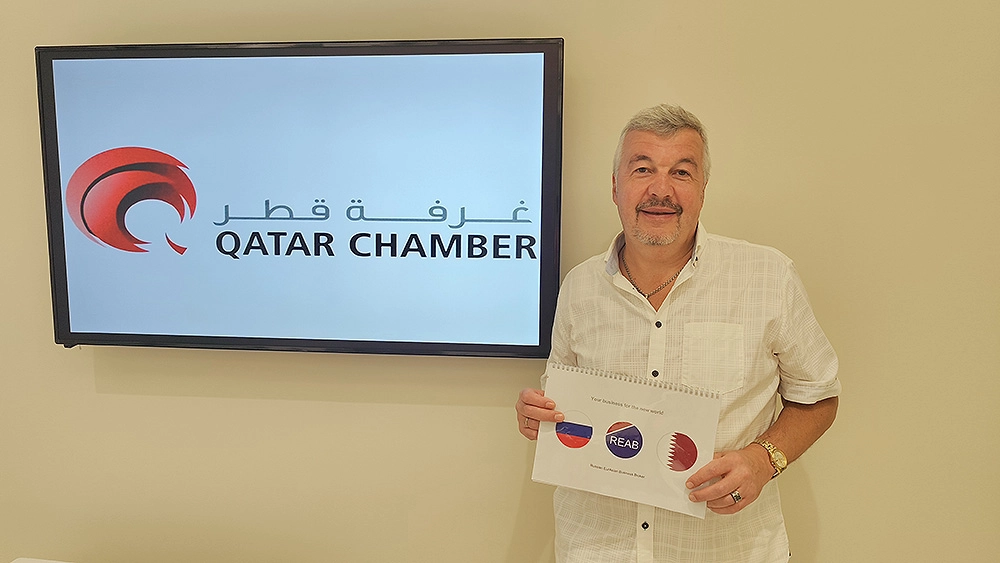
The Russian Foreign Minister Sergey Lavrov held his annual meeting in October with the heads of the four diplomatic missions of the Caspian states. In attendance were Azerbaijani Ambassador Rahman Mustafayev, Iranian Ambassador Kazem Jalali, Kazakh Ambassador Dauren Abayev, and Turkmen Ambassador Esen Aidogdyev.
The meeting was also attended by G.B. Karasin, Chairman of the Federation Council Committee on International Affairs, and L.I. Kalashnikov, Chairman of the State Duma Committee on CIS Affairs and Eurasian Integration.
Discussions included a wide range of issues related to multifaceted cooperation in the Caspian region and deepening interaction within the Caspian framework.
On the same day, a trilateral meeting on cooperation in the fields of transport, energy, and customs was held in Baku. The meeting was attended by Russian Deputy Prime Minister Alexei Overchuk, Azerbaijani Deputy Prime Minister Shahin Mustafayev, and Iranian Minister of Roads and Urban Development Farzaneh Sadeg. As a result, Russia, Azerbaijan, and Iran agreed to set up a working group to develop a plan of action for the development of the North-South international transport corridor by the beginning of next year.
That includes the need to take measures to increase the volume of traffic on the North-South international transport corridor to 15 million tons and ensure continuous growth in freight flows. An agreement was reached to create a working group to prepare an action plan for the implementation of these measures within three months. For comparison, 15 million tons is equivalent to 700,000 to 1 million TEU, or approximately 20% of the total annual TEU transshipment volume in Russia.
The participants confirmed “the importance of continuing efforts to develop the region’s transit potential,” as well as “the significance of accelerating projects aimed at developing and diversifying transport communications and, in this regard, the synchronized implementation of work to expand infrastructure along the INSTC in the relevant territories of the countries.”
An agreement was also reached to establish a special Working Group on Road Transport, consisting of the customs, border, and transport authorities of the three countries.
The signing of the regulation on the trilateral working group on customs cooperation to facilitate transit transport between Azerbaijan, Iran, and Russia. The need to simplify border crossing procedures and digitize transport, border, and customs operations throughout the corridor was emphasized.
An agreement was also reached to continue discussions at the technical level on a project to connect the electrical grids of Azerbaijan, Iran, and Russia, further assisting railway development.
The INSTC links northern Europe with the Gulf and Indian Ocean states via Russia, the Caucasus, and Central Asia. The multimodal corridor was created under an agreement signed by Russia, Iran, and India in 2000, with the number of participants now at 12. The corridor has three main routes:
Western Route: Along the west coast of the Caspian Sea, also servicing markets in Georgia, Armenia and Turkiye with additional rail connectivity to the Black Sea and the European Union;
Eastern Route: Along the east coast of the Caspian Sea, reaching into Central Asia with onward connectivity to China via Kazakhstan;
Trans-Caspian Route: Extending north-south across the Caspian Sea, using Iran as an entry point for further shipments to the Middle East, Pakistan, India, and Southeast Asia.
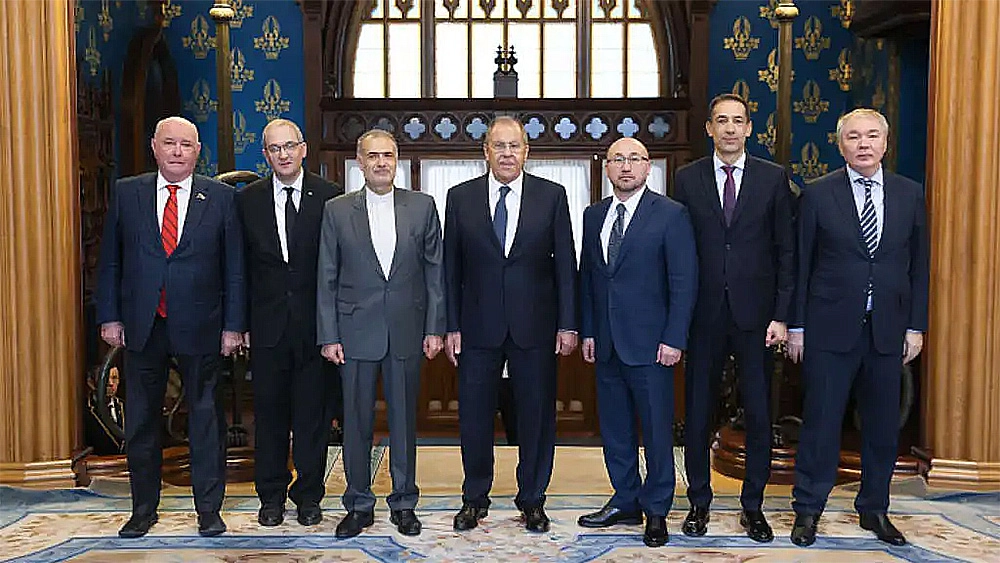
Tags:
The Russian Agroexport federal center has said that Russia aims to increase grain exports, primarily wheat, to Indonesia, and the free trade agreement between the Eurasian Economic Union (EAEU) and Indonesia, which will be signed at the end of 2025, will open up significant opportunities for this.
According to Agroexport, this year Russia exported around 123,000 tonnes of grain to Indonesia, worth US$29 million, although shipments ceased in January. However, Indonesia has now extended the accreditation of testing laboratories subordinate to Agroexport in August, making it possible to resume exports. In October, 52,000 tonnes of wheat were shipped.
Currently, wheat, soybeans, corn (including corn flour), and barley from Russia are approved for export to the Indonesian market. According to Agroexport, Russian grain exports to Indonesia for 2024 exceeded 1.3 million tonnes, valued at over US$310 million.
When the free trade agreement between the EAEU and Indonesia comes into force, a preferential tariff regime will be applied for grain exports from Russia, including a reduction of the duty on wheat from 5% to zero by one percentage point per year from the start of the agreement, Agroexport said, adding, “This is an important agreement for Russian suppliers, since Indonesia is the largest grain importer in Southeast Asia. Obtaining a zero duty when exporting wheat to the Indonesian market would be a great support.”
The complete FTA will see 93% of all bilaterally traded goods between Russia and Indonesia be reduced to zero.
Russia-Indonesia bilateral trade has been increasing and rose from US$3.3 billion in 2021 to US$4 billion in 2024. Russian tourism to the country is increasing, while several Russian manufacturers, including Kamaz, are operational in Indonesia. Another example is Softline, a prominent, Moscow-based, publicly traded IT developer, which has opened a new office in Indonesia to promote its products and services, in addition to providing vendor solutions. It sees its expert knowledge as a good match for the development potential in Indonesia, which has one of Southeast Asia’s largest online consumer markets.
The overall bilateral trade dynamics are highly positive, and especially so with the EAEU Free Trade Agreement coming into effect. Businesses from within Russia and the EAEU should be conducting market research activities to establish what products can be sold to this important consumer market.
A business mission to Indonesia by the Russian Union of Grain Exporters begins on October 17, during which “cooperation between Russia and Indonesia will be discussed, primarily on increasing supplies of grain and pulses.”
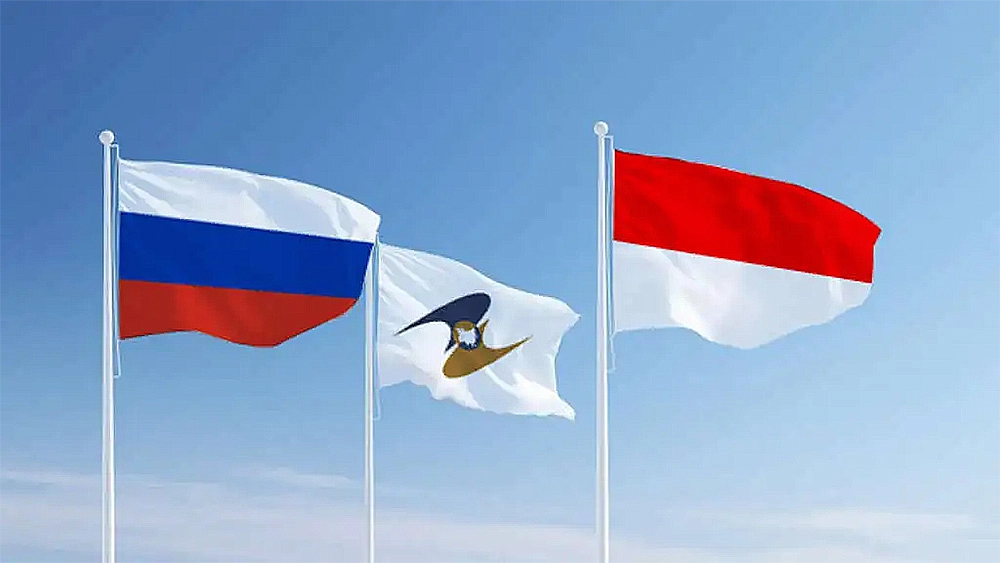
Tags:
At the end of October, a meeting was held between Ilya Pashchenko, a member of the REAB Consortium's board of directors and REAB's representative in Turkiye and the Middle East, and Mr. Şafak Yıldız, head of the consulting and legal firm Turk Adviser. The meeting was organized with the support of Vladimir Emmer, a representative of the Chamber of Commerce and Industry of the Russian Federation in Turkiye. The company provides consulting, legal, accounting, auditing, customs, and other support to international companies starting businesses in Turkiye.
The parties shared their views on the current state of Russian-Turkish economic relations, discussed possible areas of cooperation, presented the market opportunities of Turk Adviser and REAB, and identified specific working formats for the implementation of joint Turkish-Russian economic projects.
We express our sincere gratitude to all the organizers and participants of this meeting for the fruitful dialogue and hope that it will develop into a full-fledged partnership.
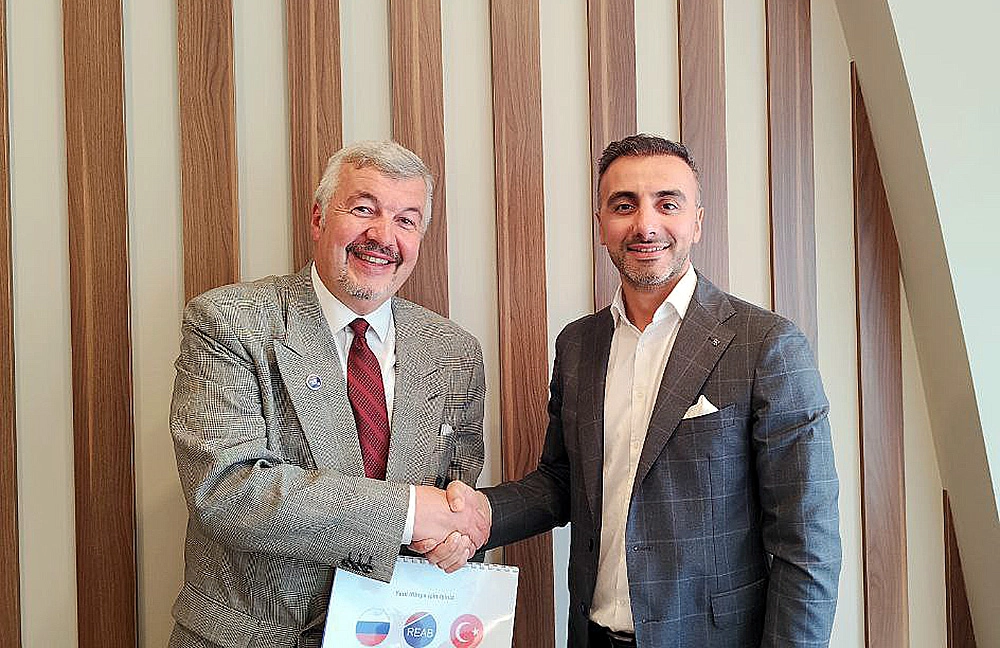
The Heads of State of the Commonwealth of Independent States member countries have approved the creation of the CIS Plus platform at the Dushanbe summit, according to a list of documents signed following the summit published by the Kremlin.
In addition to declarations and concepts on security issues—counterterrorism and military cooperation—the leaders also adopted a decision on the establishment of the Commonwealth of Independent States Plus platform.
Earlier, Russian President Vladimir Putin stated that Moscow supports the creation of a new format, as it will allow for more active involvement of other countries and international organizations in cooperation with the CIS. Presidential aide Yury Ushakov described the idea as useful and, if necessary, allowing for the involvement of other countries in resolving specific issues.
The CIS includes Armenia, Azerbaijan, Belarus, Kazakhstan, Kyrgyzstan, Russia, Tajikistan, Turkmenistan, and Uzbekistan. It is a loose trade association, with members possessing bilateral trade agreements with each other, rather than the bloc as a whole referring to specific tariff agreements. This allows more flexibility for intra-CIS trade on a mutually beneficial, ‘as needed’ basis.
A CIS+ group is likely to include Afghanistan and Iran, along with Mongolia and possibly China, especially regional representatives from Xinjiang Province. Also included could be Pakistan and India as well as Georgia, Syria, Iraq, and Turkiye. The addition of these countries makes sense in the context of the various ‘Middle Corridor’ infrastructure routes currently being developed and allows for increased dialogue in determining regional issues.
The emergence of a CIS+ bloc is of regional importance, as it extends the reach of regional trade, and infrastructure development further into both the Middle East and South Asia, both of which are deeply impacted by what happens in the Central Asian region. Some regional initiatives, such as the International North-South Transport Corridor (INSTC), which Russia is heavily investing in, can be better planned to link up with separate infrastructure projects, such as the China-Pakistan Economic Corridor, the proposed Trans-Afghan railway, the Baku-Kars-Tbilisi project and the China-Kyrgyzstan-Uzbekistan railway. Having a wider regional platform to discuss these projects will lead to greater integration and less room for wasted investment. It also allows for more frequent regional dialogue as regards fringe participants such as Georgia and Mongolia, both of whom retain indirect yet important links to the CIS bloc.
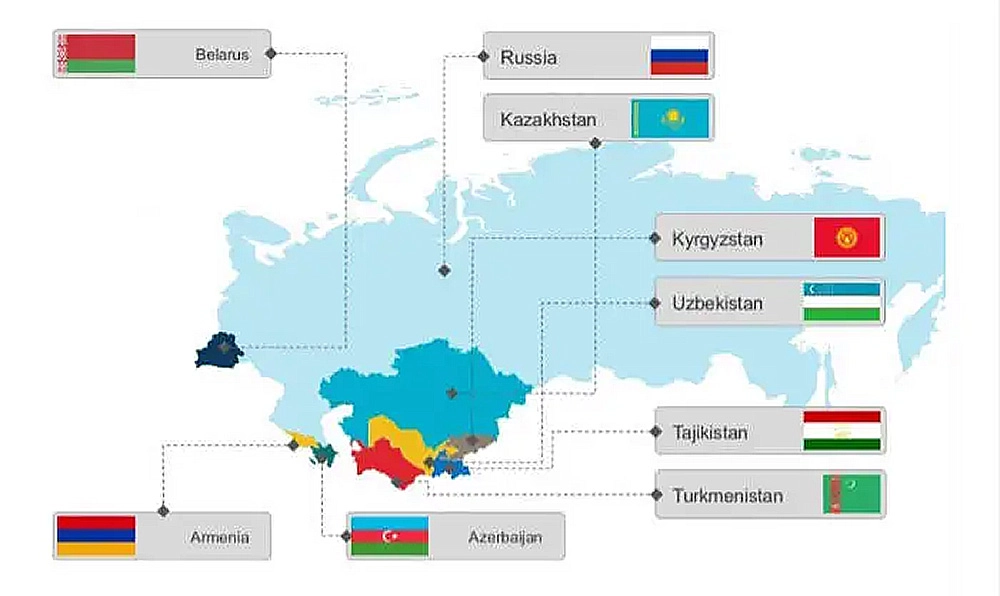
Tags:
Sergey Tsivilev, the Russian Minister for Energy, has stated that Russia is expanding cooperation with African countries “through the line of intergovernmental commissions, the number of which is growing,” the minister said, adding that he headed the intergovernmental commission with Mali and held its first meeting in July during a visit to members of the Alliance of Sahel States, which was formed in September 2023 by Mali, Niger, and Burkina Faso.
Tsivlev said, “We are counting on completing the creation of intergovernmental commissions with Burkina Faso and Niger by the end of the year. We agreed with the energy ministers of the Sahel countries to expand cooperation. We’re not limiting ourselves to the fuel and energy sector but are considering a whole set of measures aimed at the balanced and efficient development of African countries’ economies. Specifically, there is a possibility to implement joint projects that benefit several countries at once. This is joint use of ports, construction of railways, refining plants, and so on.”
Russia has also been developing diplomatic and trade relations with other African countries, such as Nigeria and Chad, and has just signed a comprehensive strategic memorandum with Sudan.
These can act as a link between West and East Africa and via Yemen, through to the Middle East and beyond to Central and South Asia. What is developing is essentially a Russian version of China’s Belt & Road Initiative, yet it links West Africa to South Asia via the Middle East.
European-era colonialism and a habit of exploiting many of these countries’ resources yet without adequately compensating for them have left many of these countries wary of European investment and, at the same time, undeveloped. That has also led to conflict and resentment within some of these countries, with Europe at times encouraging discord in order to prevent political unity.
However, China and Russia’s joint calls for better agreements, both through China’s Belt & Road Initiative and increasingly what can be seen as Russia’s version of the same, are beginning to make an impact. Tsivilev’s comments that Russia will be developing infrastructure throughout the region are a key sign that Africa’s development will come from the East and not the West.
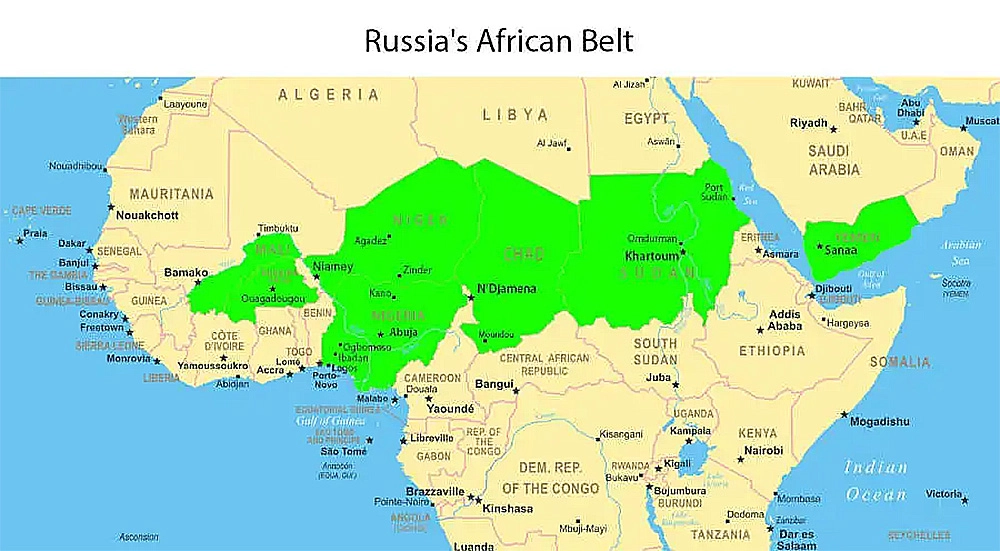


 New artıcles
New artıcles
 Useful tip
Useful tip

